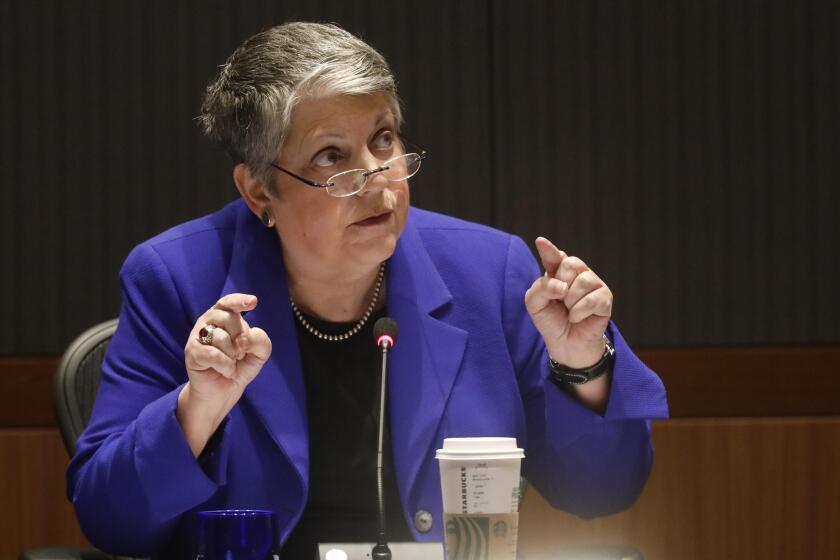ACT chief says UC students would be hurt by Napolitano plan to scrap SAT and ACT
- Share via
UC President Janet Napolitano’s proposal to suspend a standardized testing requirement will fuel student uncertainty, strain budgets and exacerbate concerns about fairness by making the admissions process more subjective, the head of the ACT testing organization said Monday.
Marten Roorda, ACT chief executive officer, criticized the proposal in a letter to members of the UC Board of Regents, who are scheduled to vote Thursday on whether to suspend and possibly eliminate standardized testing as a UC admissions requirement.
Last week, Napolitano unveiled a five-year proposal to make the SAT and ACT testing requirement optional for two years, eliminate it in years three and four and move to a new test developed for the UC system in year five. The proposal noted that the UC system already has suspended standardized testing requirements for fall 2021 applicants after the coronavirus crisis prompted test cancellations.
The unusual plan was seen as a compromise between the UC Academic Senate, which overwhelmingly voted to keep the tests while a new assessment is developed, and testing opponents who argue that the SAT and ACT are unfairly influenced by race, income and the education level of parents. ACT and the College Board, which owns the SAT, have asserted that their tests are not biased but reflect unequal access to quality education and help predict college success.
Roorda asserted that Napolitano’s proposed varying scenarios could create more confusion and “angst.”
“I respect the right of academic leaders to choose the best solutions for their institutions and students during this difficult and unprecedented time,” he wrote. “But these new recommendations will further the uncertainty and anxiety of students and their families at a time when they need all the reassurances and resources we can provide. The sweeping proposal will also strain admissions offices, state budget and the broader education system, creating more questions and concerns about fairness, equity.”
University of California President Janet Napolitano and 10 campus chancellors will take a 10% pay cut amid a budget crisis triggered by the coronavirus crisis. The UC chief also announced a systemwide salary freeze for nonunionized employees.
UC Regent Eloy Ortiz Oakley, an outspoken opponent of standardized testing, pushed back against Roorda’s remarks.
“I think it’s unfortunate that he and the ACT leadership would try to deflect any responsibility for the impact of testing on students onto UC,” he said in an interview. “It’s clear that it’s had a deleterious effect on low-income students and students of color.”
Oakley said he was “generally supportive” of Napolitano’s plan, which he praised for balancing different perspectives. But he said he had questions about whether to drop the testing requirement immediately rather than making the SAT and ACT optional for the next two years. He also said he wanted to hear discussion about whether UC should develop a new assessment or simply use high school grades, which he said is the best predictor of college success, as the main metric in evaluating applicants.
In his letter, the ACT chief also raised questions about the cost of any new assessment, which experts have put at $100 million or higher, at a time when the pandemic has led to major financial losses to the UC system. Those losses will be exacerbated by a dramatic reversal of fortunes in state funding: Gov. Gavin Newsom had initially proposed a 5% increase for the UC system for 2020-21 but last week unveiled a significant cut due to massive pandemic-related reductions in state revenues.
Roorda also asked how an assessment would be developed in five years — the Academic Senate had initially estimated it could take nine years — and whether a new UC president would be prepared to tackle “one of the largest policy shifts in your system’s history.” Napolitano has announced she will step down Aug. 1.
In addition, he expressed concern about the potential burden on students who might have to prepare for three standardized tests —a UC assessment, as well as the SAT and ACT if required by other universities they are interested in attending.
Other UC officials could not immediately be reached for comment.
More to Read
Sign up for Essential California
The most important California stories and recommendations in your inbox every morning.
You may occasionally receive promotional content from the Los Angeles Times.












